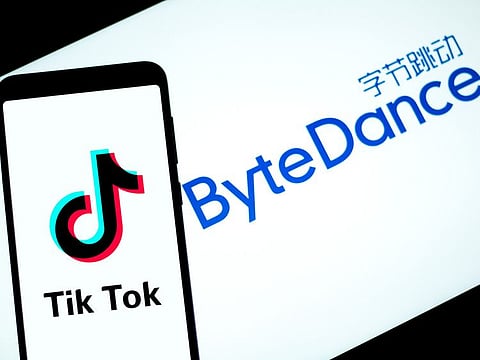ByteDance's sales break $110 billion to pass Tencent in 2023
The owner of TikTok cemented its position as one of China's internet leaders

ByteDance Ltd.'s sales surged in 2023 to more than $110 billion, according to people familiar with the matter, potentially overtaking arch-foe Tencent Holdings Ltd. in a sign TikTok's fledgling e-commerce business is driving growth at a time of economic malaise.
The world's most valuable startup's growth broadly matched the 30 per cent pace it managed in 2022, when it reported sales in excess of $80 billion, the people said, asking not to be identified as the information isn't public. That's despite economic turbulence in China and elevated scrutiny and restrictions in key markets from the US to India.
The owner of TikTok and Chinese-twin Douyin this year cemented its position as one of China's internet leaders, alongside Tencent and Alibaba Group Holding Ltd., leveraging the popularity of its social video services to expand into e-commerce and other spheres. At roughly 30 per cent, ByteDance would outpace the projected growth of far more established social media rivals Meta Platforms Inc. and Tencent, which is estimated to generate $86 billion in revenue this year.
It's not clear how ByteDance "- which as a private firm has far fewer disclosure and audit requirements versus its listed rivals "- performed in profitability this year. While its internal numbers haven't been independently audited, the sheer scale suggests the social media juggernaut in 2023 became one of China's largest corporations by revenue. Its earnings before interest, tax, depreciation and amortization surged 79 per cent to about $25 billion in 2022, the Financial Times reported in April, citing investors briefed on the number.
Shares in several Chinese companies that do business with ByteDance, including Beijing Yuanlong Yato Culture Dissemination Co., surged their daily limits of 10 per cent on Thursday. A ByteDance spokesperson declined to comment.
ByteDance is banking on its Chinese home base to bankroll a global and business expansion in 2024.
In China, Douyin is morphing to become an all-in-one platform with built-in features for food orders, flight tickets and hotel reservations, encroaching on the main territory of Alibaba and delivery leader Meituan. Abroad, TikTok is following that strategy to blend videos and shopping in markets like the US and Indonesia, where it has taken control of GoTo's e-commerce unit Tokopedia. The $1.5 billion deal, which marks one of ByteDance's biggest takeovers in recent years, allows TikTok to restart its online retail service after months of scrutiny by the Indonesian government.
In the US, TikTok is still working to address concerns around national security due to its Chinese ownership by setting up a standalone team to manage local user data. The hostility reached its peak in March, when American lawmakers grilled TikTok Chief Executive Officer Shou Chew in a five-hour hearing. But Washington quickly shifted to issues like semiconductors and venture funding.
Longer term, it remains to be seen if ByteDance can continue to challenge the major incumbents on their turf or make its mark in artificial intelligence.
ByteDance has tried to expand beyond the social media apps that pushed its valuation to above $200 billion, the highest of any startup in the world, with limited success.
The company this year pulled the plug on its game development business, slashing hundreds of jobs while weighing sales of existing projects. Its ChatGPT-like service, Doubao, competes with a sea of Chinese AI bots funded by well-known venture firms and fellow technology companies.
The company founded more than a decade ago by coding wizards Zhang Yiming and Liang Rubo is one of the few remaining Chinese internet IPO candidates, but there's still no clear path to its eventual stock market debut. In the latest round of investor buybacks, it's offering to purchase up to $5 billion from shareholders at a valuation of $268 billion, roughly 11 per cent lower than the price in a similar program in 2022.
Sign up for the Daily Briefing
Get the latest news and updates straight to your inbox







